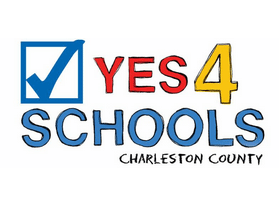Charleston Metro Chamber and Community Leaders Announce Yes4schools
October 2, 2014Charleston Campaign in Support of Education Capital Improvement Referendum
Passage will bring $736 million economic impact to the region, create thousands of jobs,alleviate overcrowding and increase safety and technology for students
CHARLESTON, SC – The Charleston Metro Chamber of Commerce, together with two area mayors and other community leaders, kicked off theYes4SchoolsCHS campaign at a press conference in North Charleston on Wednesday. Yes4SchoolsCHS supports the Education Capital Improvement Referendum that will appear on the November 4 election ballot in Charleston County.
Passage of the referendum, which proposes an extension of a one-penny sales tax originally approved in 2010, would allow for dozens of school construction and renovation projects aimed at alleviating severe overcrowding in facilities across the Charleston County School District. An affirmative vote would also create thousands of jobs, while providing a $736 million economic boost to the region between 2016 and 2022.
Additionally, the referendum’s passage would fund needed repairs, facility maintenance upgrades – such as HVAC systems – and technology improvements in schools countywide.
“Simply put, if the referendum is passed, every CCSD school and student will be positively impacted,” said Patrick Bryant, Yes4SchoolsCHS campaign chairman.
Chamber and elected officials noted today that the Education Capital Improvement Referendum is not a new tax, nor a tax increase. It is a limited time-frame commitment during which everyone contributes, including non-residents, who will provide about 40 percent of the program’s funding. Household necessities such as food and prescription medicine are not subject to any additional tax. Should the referendum fail to pass, property taxes in the county would likely increase substantially.
Mayors Riley, Summey and Page have all announced support for the ballot referendum. Mayors Summey and Page attended and spoke at the event. William Dudley Gregorie, Charleston City Councilman District Six, was also in attendance representing his district and Charleston Mayor Joe Riley, Jr.
At today’s event, Bryant who helmed the successful Yes4Schools campaign in 2010, cited examples of overcrowding in the district.
“This school behind us (referring to Dunston Primary School on Remount Road in North Charleston) was built for 221 students. Yet 430 students are on this campus, which echoes what’s happening across the district. We need this new infrastructure to help students learn in positive way.”
Mount Pleasant Mayor Linda Page echoed Bryant’s sentiments in regard to the importance of classrooms that are now overcrowded.
“Schools are not just buildings, but environments for learning. If the environment isn’t conducive to learning due to overcrowding, then student achievement and teacher planning is negatively affected,” Page said. “We need to pass this sales tax extension not just for Mount Pleasant schools, but for all schools in the county.”
North Charleston Mayor Keith Summey highlighted education’s importance to the region in the years ahead.
“Education is the backbone of the future of this community and this nation. We have to prepare these kids; we need the highest technology in classrooms and facilities that don’t force students to go into a trailer to get educated,” Summey said.”We need facilities that our students are proud of, and if they are proud of their school, you will see it in their response to what they are being taught. This is a must situation for us in Charleston County.”
Amy Jowers Mikell of the Citizens Advisory Steering Committee shared information about that group, developed after passage of the 2010 referendum, to review the financing and execution of capital program projects funded by the tax. The committee, which has met monthly since June 2011, reviews construction projects’ status, costs and other information to ensure two-way communication between the school district and the communities benefiting from the building projects.
“The new schools built thus far are impressive and the school district has worked hard to provide the committee with transparency in the use of sales tax proceeds,” Mikell said. “Many of our neighborhood schools have benefited from the campaign, but there is more work to be done. All students in the district deserve the opportunity to learn in a state-of-the-art school environment. I urge voters of Charleston County to join me in voting yes for schools this November.”
Charleston will host a series of community meetings in October during which residents can have their questions answered.
In the meantime, for more information on the Education Capital Improvement Referendum and how to get involved with Yes4Schools – Charleston, visitYes4SchoolsCHS.com.
About the Chamber: With more than 1,700 member organizations representing 100,000 professionals, the Charleston Metro Chamber of Commerce serves as the collective voice of the business community, and a catalyst for advancing the region’s economy and enhancing members’ success through Advocacy, Innovation, Talent and Business Advancement. Visit charlestonchamber.net.













